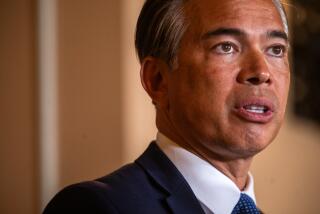State Reveals Investigation of L.A. Judge, Cites Secrecy
Los Angeles Municipal Judge David M. Kennick, whose tenure as supervising judge in San Pedro was marked by controversy, is under formal investigation by the state Commission on Judicial Performance, it was announced Monday.
The San Francisco-based commission took the unusual step of making public the confidential investigation because of previous reports about it in a legal newspaper, said Jack E. Frankel, the commission’s director and counsel.
Citing secrecy requirements, however, Frankel declined to disclose the nature of the allegations against the 49-year-old Kennick, who has been on medical leave from his judicial post since the beginning of this year.
Kennick, who is continuing to receive his $75,000-a-year salary, could not be reached, and his attorney, Gilbert L. Flanders, had no comment on the commission’s inquiry.
Last year Kennick drew attention when it was reported that he had tried to persuade a California Highway Patrol officer who arrested him for drunk driving in August, 1985, to drop the case. The judge pleaded no contest the following October to one count of drunk driving.
In a memo accompanying his arrest report, CHP Sgt. Keith Bladow said Kennick asked to speak with him “off the record” and subsequently said he “would like to make a deal or something.”
The district attorney’s office investigated the incident but decided there was insufficient evidence to warrant prosecution.
Last May, a cocktail waitress about to stand trial for drunk driving complained publicly that Kennick had offered to dismiss charges against her in exchange for sexual favors. The district attorney’s office announced that it was reviewing the complaint but then dropped the matter because the waitress, Mary Davis, 45, of Lomita, failed to pursue the allegations through legal channels.
Flanders said Monday that both allegations were untrue. Last year, Kennick filed a defamation suit against Davis.
At the same time, lawyers in the San Pedro area were accusing Kennick of showing favoritism to three friends in appointing them as lawyers for the indigent.
George W. Trammell, presiding judge of the Los Angeles Municipal Court, said a county auditor who looked into Kennick’s conduct at Trammell’s request confirmed that a “disproportionate” amount of business was going to “a small group of lawyers I knew to be good friends of his.”
Half the Business
The audit showed that for the first nine months of 1986, 58.5% of Kennick’s appointments went to three attorneys, David J. Pantoja of Commerce and his associate, Susan E. Maxwell, and Theodore P. Veganes of San Pedro, Trammell said.
Canon 3 of the California Code of Judicial Conduct states that a judge “should exercise his power of appointment only on the basis of merit, avoiding nepotism and favoritism.”
Pantoja and Maxwell could not be reached for comment. Veganes said through his office that it was inappropriate to comment on a pending commission investigation.
Flanders said he could not comment on the county audit, but he said, “Judges try to get the most competent lawyers they can get . . . and they can only pick from people who are willing to do the work.”
Trammell said he decided late last year to replace Kennick in San Pedro and transfer him to traffic court downtown.
“I wanted a stronger supervising judge, and I didn’t think Dave fit the bill,” Trammell said.
‘Emotional Stress’
When he informed Kennick about the new assignment, however, Kennick said that after a two-week vacation he was taking a medical leave for “the foreseeable future” because of “emotional stress.”
“He looked really drained,” Trammell said. “He looked like a person who had had an awful lot of him just sapped out of him.” Trammell said he has not spoken to Kennick since.
“I literally do not know where David is,” the presiding judge said.
Flanders, who described his client as “psychologically disabled” as a result of his workload, said Kennick is living in the San Pedro area.
Frankel said Kennick had applied to the Commission on Judicial Performance for a disability pension but noted that it was not linked to the disciplinary investigation.
Under the law, the commission is empowered to investigate complaints of misconduct against judges and recommend that the Supreme Court remove them from office or censure them publicly. In addition, the commission on its own may privately admonish or warn a judge over less serious misconduct.
Appointed to the bench by then-Gov. Ronald Reagan in 1972, Kennick had served as supervising judge in San Pedro for one year.
More to Read
Sign up for Essential California
The most important California stories and recommendations in your inbox every morning.
You may occasionally receive promotional content from the Los Angeles Times.










